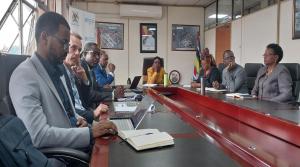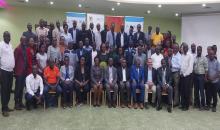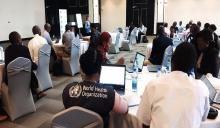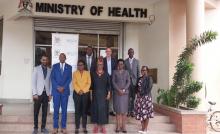WHO conducts mid-term review of Uganda’s response to TB
Kampala - Tuberculosis (TB) remains one of the world's deadliest infectious killers and a growing challenge in Uganda with each day close to 240 people falling ill with TB and approximately 30 losing their lives. More than half of TB-related deaths are among people living with HIV, yet it is preventable and curable.
Uganda is one of the world's thirty (30) high-burden countries for TB and TB/HIV co-infection. Each year, approximately 91,000 people in Uganda get sick of TB with 32% of them being HIV-infected. Two out of every 100 people with TB have drug-resistant TB that is not cured by first-line drugs, while approximately 15% of TB cases in Uganda are children aged below 14 years.
To address the country's TB burden, the Ministry of Health (MoH) developed a robust TB and Leprosy Strategic Plan 2020/21-2024/25), that emphasizes patient care among other interventions. The strategy highlights the implementation status of the country's TB response in relation to the strategic direction, global evidence, and high-level advocacy.
Uganda’s efforts towards ending TB include collaboration and engaging multi-stakeholder partnerships and stakeholders to accelerate TB control measures. This collaboration resulted into the USA’s Centers for Disease Control (CDC) opening a multi-drug resistant TB (MDR-TB) treatment center at the Uganda Prisons Service headquarters. The center is the sole referral and management center for incarcerated patients with MDR-TB in Uganda.
With support from the Ministry of health, WHO coordinated partners to plan and conduct a Mid-Term Review of the National Strategic Plan for TB and Leprosy Control 2020/21-2024/25 (TB NSP MTR) to ascertain the progress and challenges faced in implementation.
In December 2022, an internal desk Mid-Term Review of the National Strategic Plan for TB and Leprosy Control 2020/21-2024/25 (TB NSP MTR) was conducted using WHO-recommended processes described in the updated TB Review Guidelines which assessed midterm implementation progress. This review was conducted in April 2023 by a team of internal and external reviewers from MOH, WHO, USAID, Global Fund, CDC, FHI, Stop TB Partnership (STP), and academia.
The team of external reviewers led by Dr. Jean de Dieu Iragena from WHO-AFRO, conducted stakeholder interviews, visited health facilities, communities, assessed the people centered service delivery model and evaluated thematic areas of governance, project management and financing. At the end of the review, the team briefed Dr. Jane Ruth Aceng, the Minister of Health on the findings culminating into a stakeholder workshop facilitated by the review team.
‘‘I call upon stakeholders to ‘close the dent’ in reducing the burden of TB and close critical funding gaps to ensure universal access to TB prevention and care as well as for research, more investments towards supporting the rollout of WHO recommended TB preventive treatment options and shorter TB treatment regimens,’ said Dr. Aceng while responding the report of the review team.
She noted the lack of awareness of the TB challenge and called for domestic funding and strengthen Private Not-for-Profit facilities by piggybacking on other programmes such as immunization to enhance community engagement.
The WHO teams also met Dr. Henry Mwebesa, the Director General of Health Services with whom they discussed the findings and recommendations from the mid-term review as well as the multi-sectoral accountability framework.
Dr. Daniel Kyabayinze the Director of Public Health in the Ministry of Health appreciated the evaluation team and all healthcare workers for working tirelessly towards a successful review. He appreciated the teams for the great work done especially the in-depth review of the national response.
“The disease is in our communities, but our surveillance has not been adequate. The way we have been doing contact tracing needs to be strengthened to be able to reach out to more people. We need to benchmark on Ebola and Covid-19 surveillance and contact tracing. We need to strengthen awareness. It may be expensive, but it can be achieved by improving community strategy,” said Dr. Stavia Turyahabwe, Assistant Commissioner Health Services- Tuberculosis Leprosy Control at Ministry of Health.
She appreciated the team for mapping TB hot-spots and pledged intensification of contact tracing of patients to over 90% case detection. She added that reaching people living with HIV and TB contacts with preventive treatments also remain program priorities.
Michaele Layng, the USAID HIV/TB team Lead promised USD 8 million towards Uganda’s TB goals. She encouraged participants to share lessons and best practices to inform the process. Her colleague Seyoum Dejene, HIV/TB Advisor- USAID, shared views on planning processes and gave guidance on the TB road map.
The program review report is in the final stages of development and will be shared and used to guide planning and implementation in the remaining period of the strategic plan.
Communications Associate
WHO Uganda Country Office
Email: afwcougcom [at] who.int (afwcougcom[at]who[dot]int)
Phone: +256740487734
Communications Officer
WHO Uganda
Email: tcheutchouae [at] who.int (tcheutchouae[at]who[dot]int)



